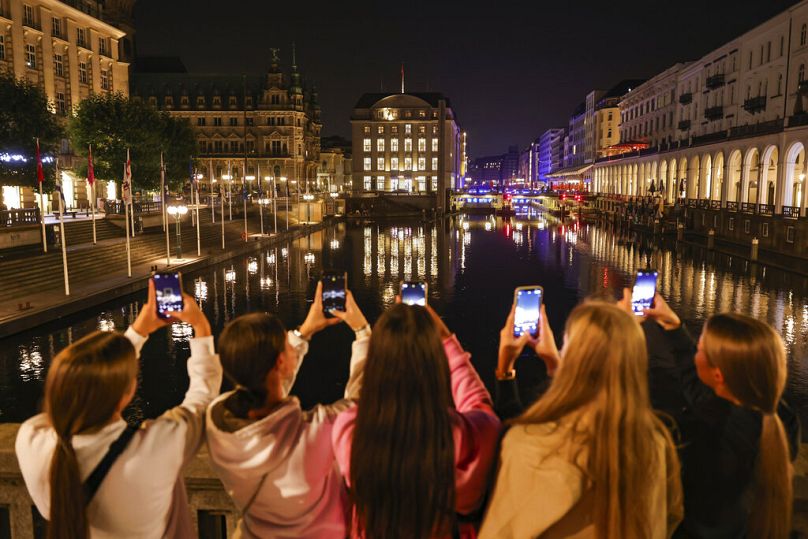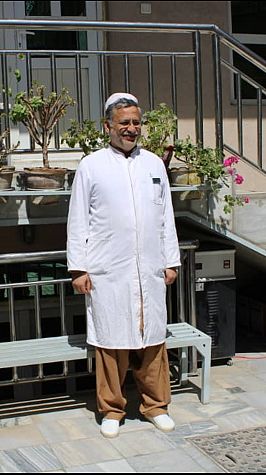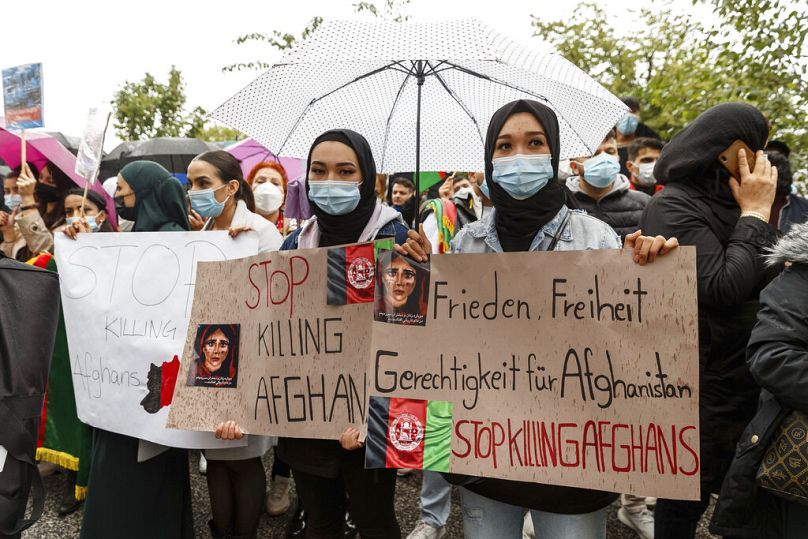Germany has more Afghans than any other country in Europe.
With more than a quarter-million Afghans and their descendants calling it home, Germany boasts the largest Afghan diaspora in Europe.
 ADVERTISEMENT
ADVERTISEMENT
 ADVERTISEMENT
ADVERTISEMENT
Afghans and Afghan-Germans have built a lively -- if often -- overlooked community in Germany.
Part of their identity is tied to a longing for home, which has only been intensified as the situation in Afghanistan grows increasingly dire.
As a war that’s spanned four decades takes its latest turn and the Taliban appear to have captured most of the country, many of Germany’s Afghans are now consumed with supporting the family, friends and colleagues that have yet to manage to flee.
'Germany is a top destination but many won't make it here'
Dr Yahya Wardak runs AFGHANIC, an organisation supporting the integration of Afghans in Germany, as well as providing services, including a health clinic in Kabul, in Afghanistan itself. He’s been trying to support colleagues and relatives who are still in Afghanistan.
“We’re in contact with them. They’re worried, they’re afraid. I try to advise and help them as well as possible, but it’s difficult to provide support,” Wardak told Euronews.
While many Afghans are trying to flee the country and make their way to Europe, the European Union is currently working to keep Afghan refugees in neighbouring countries and away from the continent.
“Afghans have been attempting to flee the country for a long time, not just after August 15. Even before then, thousands were attempting to flee, but Europe closed its borders… Germany is a top destination, but most won’t make it here,” he said.
Maria Hosein-Habibi is associate director at VAFO (the Association of Afghan Organizations in Germany), which focuses on uniting Afghan organizations to help provide increased visibility and a voice for the diaspora and Afghan-German experts.
VAFO is lobbying for continued negotiations and evacuations, particularly in the wake of several flights returning to Germany with fewer refugees than possible.
“There are lots of people still stranded in Afghanistan, both citizens and local staff. So the problem has yet to be solved. We’re calling on the government to take action in order to protect the rights of minorities and women, and so that civil society can be respected and strengthened. We’re hoping to avoid the human rights violations that have happened in the past, and all of this has to be accomplished at the political level,” Hosein-Habibi said to Euronews.
Though the situation looks bleak, she supports controversial pushes from the German government to continue negotiations with the Taliban.
“It’s a very difficult situation. Maybe it’s hard to grasp, but of course, we have hope. But we need to work in order to make it possible. The Taliban are to a certain extent financially dependent on how fines and sanctions develop, which means there is a possibility for negotiation, this opportunity just has to be recognised. What cannot happen is a return to the politics of isolation which we have seen in the past, where civil society was left alone to deteriorate,” she said.
'Hamburg is a gateway to the world for many Afghans'
Though large-scale evacuations in the immediate future seem unlikely, Germany is a natural destination due to its large Afghan population. A large portion of those living in Germany arrived as refugees.
Dr Yahya Wardak told Euronews that the Afghan Diaspora in Germany is, “a very heterogeneous group, as Afghanistan is a very heterogeneous country, a truly multi-ethnic country. And Afghan refugees didn’t all come to Germany at once. They came in waves.”
Wardak first arrived in Hamburg in 1992. His arrival there was no coincidence. With an estimated 35-40,000 Afghan residents, Hamburg is home to more Afghans than any other city in Europe.
“Hamburg was a gateway to the world for many Afghans,” said Wardak.
Though the growth of Hamburg’s Afghan population coincided with refugees fleeing war and truly first took off 40 years ago, Afghanistan’s ties to the northern German city stretch further back thanks to Hamburg’s importance to global trade networks.
“The first students and merchants came to Hamburg after World War 2. They brought raisins, grapes and carpets from Afghanistan to sell, or to export further to the United States or elsewhere. And they brought cars, machinery and chemicals back to Afghanistan,” he said.
A sprawling European city, famous for lashing rainfalls and one of the biggest ports on the continent, linking the low-lying city to the North Sea, seems like an odd destination from a ruggedly mountainous, landlocked country at the crossroads of Central and South Asia.
Léma, Wardak’s niece, was born and raised in Hamburg and first visited Kabul as a teen. According to her, it is difficult to compare the two.
“Hamburg is really beautiful. That’s just a fact. Kabul isn’t the prettiest city, but the landscapes, the mountains, the streets, and the way people were towards one another, their hospitality. The closeness people have towards one another, all this sticks with you,” she told Euronews.
Afghans live throughout the greater Hamburg area, though the Steindamm area, just northeast of the city centre, has a high enough concentration of Afghans to feel like ‘Little Kabul’, said Léma.
Hamburg’s large Afghan community helps make the city feel like home, even worlds away from Afghanistan.
“When I was younger I know I used to complain and wonder why my parents would want to live in Hamburg, it rains all the time and is so cold, why not Italy or Spain or something? But everything is really nice in Hamburg, it’s grown on me. And there truly are lots of Afghans here. You can’t go to the central station without seeing about 10 of them,” she said.
What is life like for Afghans in Germany?
Though Léma, 23, has never lived in Afghanistan, recent events are still difficult to process.
“Every Afghan has come to terms with the country’s history, what’s going on there now and what’s already happened. And when you realise that what happened 20 years ago with the Taliban coming to power is going to repeat itself, it’s hard for everyone to take,” said Léma.
For the Afghans who do make it to Germany, things won’t necessarily be easy. According to Maria Hosein-Habibi, asylum seekers from Afghanistan often have difficulty with their application process and receiving support.
“For years, refugees from Afghanistan have not been treated like refugees from other countries. This in part has to do with the security classifications assigned to Afghanistan. This, in turn, gives Afghans seeking refuge limited rights, less access to courses and support. Which is something that is really felt in the diaspora. And I can imagine that the current situation is also very unnerving for Afghans that have recently fled and put in asylum applications in Germany because it could affect their chances here,” she said.
As of 2020, there were more than 40,000 asylum seekers from Afghanistan in Germany, more than any other country.
Dr Yahya Wardak told us that letting asylum applications sit for years hurts integration, as it limits asylum seekers’ ability to study, learn the language, or access the job market.
He experienced this himself when he first arrived in Germany.
“I had to wait 10 years. I couldn’t work, I couldn’t take a language course outside of Hamburg, I couldn’t further my education. It was really difficult for me. Our lives were made harder. The toughest phase of my life wasn’t in Afghanistan but in Hamburg… it’s catastrophic for many young people, who only want an education and to achieve something but have to go through hell,” he said.
'We're not recognised as being part of German society'
Like many Afghans, Wardak has worked hard to flourish in Germany. Though Afghans are one of the largest immigrant groups in Germany, Hosein-Habibi thinks they have a disproportionately small representation in German society at large.
“We’re part of society but aren’t really recognised as such. This is partly because of the extent to which Afghanistan is represented in the media, it’s usually via some kind of horrific news story. I’d bet the mainstream association with Afghanistan is extremely negative, which I don’t think reflects reality,” she said.
Poor Afghan representation is particularly noticeable in media and political discourses, where discussions about Afghanistan are extremely common, but rarely involve Afghans themselves.
“There are plenty of people with Afghan roots who are actually affected by the topics being discussed, and further, there are also many people with Afghan roots who are also experts in their field. So a good first step would be to invite these people to these discussions. This would help to provide a different perspective… which would also mean that the only association most people have with Afghanistan would no longer be horror stories and grim news reports,” she continued.
Advocates and activists like Wardak and Hosein-Habibi are striving to support those attempting to flee Afghanistan. Meanwhile, they also focus on improving integration and representation for Afghans in Germany, so that when Afghans do arrive here they can have improved prospects. But it’s the vibrant diaspora, like that concentrated Hamburg and sprinkled throughout the rest of the country, that will ensure Afghans in Germany country have a community.
Every weekday, Uncovering Europe brings you a European story that goes beyond the headlines. Download the Euronews app to get a daily alert for this and other breaking news notifications. It's available on Apple and Android devices.













